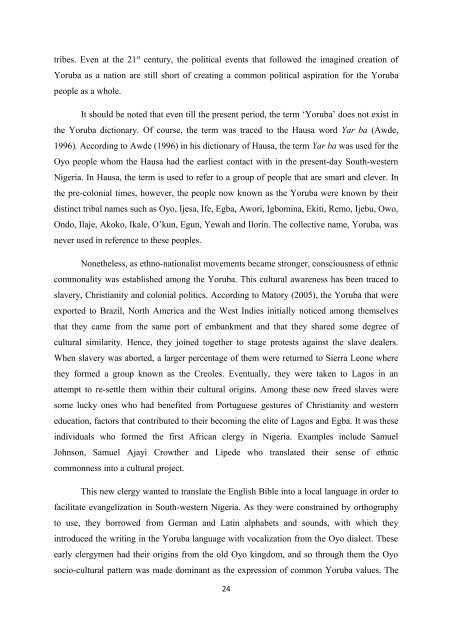The Yoruba Nationalist Movements, Ethnic Politics and Violence: A ...
The Yoruba Nationalist Movements, Ethnic Politics and Violence: A ...
The Yoruba Nationalist Movements, Ethnic Politics and Violence: A ...
Create successful ePaper yourself
Turn your PDF publications into a flip-book with our unique Google optimized e-Paper software.
tribes. Even at the 21 st century, the political events that followed the imagined creation of<br />
<strong>Yoruba</strong> as a nation are still short of creating a common political aspiration for the <strong>Yoruba</strong><br />
people as a whole.<br />
It should be noted that even till the present period, the term ‘<strong>Yoruba</strong>’ does not exist in<br />
the <strong>Yoruba</strong> dictionary. Of course, the term was traced to the Hausa word Yar ba (Awde,<br />
1996). According to Awde (1996) in his dictionary of Hausa, the term Yar ba was used for the<br />
Oyo people whom the Hausa had the earliest contact with in the present-day South-western<br />
Nigeria. In Hausa, the term is used to refer to a group of people that are smart <strong>and</strong> clever. In<br />
the pre-colonial times, however, the people now known as the <strong>Yoruba</strong> were known by their<br />
distinct tribal names such as Oyo, Ijesa, Ife, Egba, Awori, Igbomina, Ekiti, Remo, Ijebu, Owo,<br />
Ondo, Ilaje, Akoko, Ikale, O’kun, Egun, Yewah <strong>and</strong> Ilorin. <strong>The</strong> collective name, <strong>Yoruba</strong>, was<br />
never used in reference to these peoples.<br />
Nonetheless, as ethno-nationalist movements became stronger, consciousness of ethnic<br />
commonality was established among the <strong>Yoruba</strong>. This cultural awareness has been traced to<br />
slavery, Christianity <strong>and</strong> colonial politics. According to Matory (2005), the <strong>Yoruba</strong> that were<br />
exported to Brazil, North America <strong>and</strong> the West Indies initially noticed among themselves<br />
that they came from the same port of embankment <strong>and</strong> that they shared some degree of<br />
cultural similarity. Hence, they joined together to stage protests against the slave dealers.<br />
When slavery was aborted, a larger percentage of them were returned to Sierra Leone where<br />
they formed a group known as the Creoles. Eventually, they were taken to Lagos in an<br />
attempt to re-settle them within their cultural origins. Among these new freed slaves were<br />
some lucky ones who had benefited from Portuguese gestures of Christianity <strong>and</strong> western<br />
education, factors that contributed to their becoming the elite of Lagos <strong>and</strong> Egba. It was these<br />
individuals who formed the first African clergy in Nigeria. Examples include Samuel<br />
Johnson, Samuel Ajayi Crowther <strong>and</strong> Lipede who translated their sense of ethnic<br />
commonness into a cultural project.<br />
This new clergy wanted to translate the English Bible into a local language in order to<br />
facilitate evangelization in South-western Nigeria. As they were constrained by orthography<br />
to use, they borrowed from German <strong>and</strong> Latin alphabets <strong>and</strong> sounds, with which they<br />
introduced the writing in the <strong>Yoruba</strong> language with vocalization from the Oyo dialect. <strong>The</strong>se<br />
early clergymen had their origins from the old Oyo kingdom, <strong>and</strong> so through them the Oyo<br />
socio-cultural pattern was made dominant as the expression of common <strong>Yoruba</strong> values. <strong>The</strong><br />
24

















